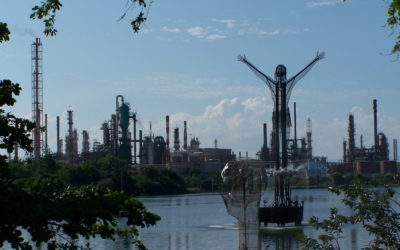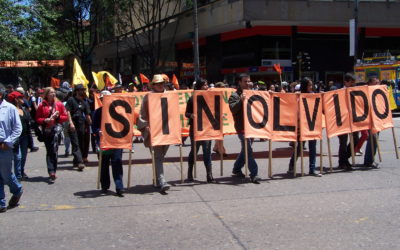autor: kolko, FDCL, Robin Wood, terre des hommes
President
Juan Manuel Santos Calderón
Palacio de Nariño
Bogotá
Colombia
Berlin, 20.12.2012
Open Letter on the situation of land restitution for the communities living in the humanitarian zones and areas of biodiversity in Curbaradó and Jiguamiandó.
Dear Mr. President,
For many years, citizens in Germany have been aware of the situation of the afrodescendant and campesino communities living in the humanitarian zones and areas of biodiversity in the Curbaradó and Jiguamiandó river basins, in the department of Chocó. Once again, over the past few weeks, hundreds of people have sent postcards and emails to you, supporting the just claim of the communities to their land. We are worried about the communities’ rights to life, food and physical integrity as well as the protection of the region’s ecosystems which are of extraordinary importance to humanity, and the communities living there.
Unfortunately, we have received information about the deterioration of the situation in the region:
– On various occasions over the past few weeks information was received regarding the paramilitary groups’ plans to attack community members of the humanitarian zones and areas of biodiversity of Curbaradó and Jiguamiandó. We are deeply concerned about information that has revealed plans to assassinate community leaders claiming land restitution and who are part of the community councils of humanitarian zones and areas of biodiversity in Curbaradó and the adjacent community Pedguita Mansanilla;
– The continuation of defamation, surveillance and threats against the human rights defenders of the “Comision Intereclesial de Justicia y Paz”, who are accompanying
the community in their efforts;
– The silting-up of the Jiguamiandó river causing flooding in the communities of Bella Flor Remacho, Cano Seco, Nueva Esperanza and Santa Rosa del Limón, which jeopardizes their agricultural activities and the ecosystem. The clearing of the blockages has not been carried out, despite of Constitutional Court decision T48257 of 21th of October 2010;
– Illegal coca crop cultivation and laboratories continue on the land of these communities. This situation persists despite both the publically expressed rejection of these activities by the communities organized in the humanitarian zones and areas of biodiversity as well as a strong military presence, especially in the entry points to the region; this was also verified and publically denounced by international missions to the region in February and November 2012;
– The continued existence of illegal plantations of plantains, manioc and oil palm, and of extensive cattle ranching, as well as the new addition of buffalo raising
taking place unlawfully on the communities’ territory. Workers of these plantations and farms harass and threaten the community members of the humanitarian and biodiversity zones;
– Paramilitary presence in the region continues;
– A military base is being constructed by the army unit “Batallón No 100”, on the land belonging to the Llano Rico community council, without prior consultation with the community. This military base is being constructed on land used unlawfully by companies; Whilst Victims Law 1448 is an important step forward, implementation of land restitution is a key issue. Therefore, the Colombian government must ensure the safety and security of the communities reclaiming their land.
Taking into account the previously mentioned factors and in order to fulfill the human rights commitments internationally adopted by the Colombian State, especially the
provisional measures issued by the Interamerican Court for Human Rights for the inhabitants of the humanitarian zones and areas of biodiversity of Jiguamiandó and
Curbaradó, we ask you to:
- guarantee the effective restitution of the occupied land to the communities of the humanitarian zones and areas of biodiversity of Curbaradó and Jiguamiandó river
basin. Guarantee the return to their land as well as their right to freely use this land, including the implementation of their agro-ecological proposals, as ordered by the Constitutional Court on 10 May 2010; and as ordered by the report of the agricultural institute INCODER on 12 July 2012. - guarantee the safety of the community members; implement the collective protection plan proposed in May 2012 by the community members living in the humanitarian zones and areas of biodiversity to the national protection unit;
- guarantee that the general attorney’s office carries out effective, systematic and contextual investigations in order to fully identify and hold to account those who are responsible for crimes against the community and of those who allowed, protected or benefitted from the illegal use of the community’s land;
- guarantee the safety and good faith of the members of the human rights defenders of the “Comisión Intereclesial de Justicia y Paz” who accompany the
communities
Yours sincerely
G. Neuscheler
Director, kolko – Menschenrechte für Kolumbien



